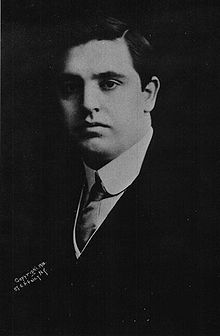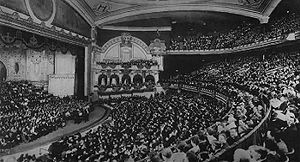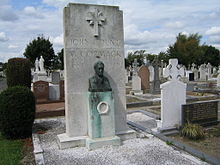- John McCormack (tenor)
-
This article is about the Irish tenor. For other people of the same name, see John McCormack (disambiguation).
John Count McCormack,[1][2] in full, John Francis Count McCormack[3] (14 June 1884 – 16 September 1945) was a world-famous Irish tenor singer, celebrated for his performances of the operatic and popular song repertoires, and renowned for his diction and breath control.[4] He was also a Papal Count.
Contents
Early life
McCormack was born in Athlone, Ireland, the fourth of eleven children of Andrew McCormack and Hannah Watson[5] on 14 June 1884, and was baptised in St. Mary's Church, Athlone on 23 June 1884. His parents were employed at the Athlone Woollen Mills.
McCormack received his early education from the Marist Brothers in Athlone, and later attended Summerhill College, Sligo. In 1903 he won the coveted gold medal of the Dublin Feis Ceoil. He married Lily Foley in 1906 and they had two children, Cyril and Gwen.
In March 1904, McCormack became associated with James Joyce, who at the time had singing ambitions himself. Richard Ellmann, in his biography of Joyce, states that, "Joyce spent several evenings with him" (i.e. McCormack), practising; along with Joyce's acquaintance Richard Best, McCormack persuaded Joyce to enter the Feis Ceoil that year.[6]
Career
Fundraising activities on his behalf enabled McCormack to travel to Italy in 1905 to have his voice trained by Vincenzo Sabatini (father of the novelist Rafael Sabatini) in Milan. Sabatini found McCormack's voice naturally tuned and concentrated on perfecting his breath control, an element that would become part of the basis of his renown as a vocalist.
In 1906, he made his operatic début at the Teatro Chiabrera, Savona. The next year he began his first important operatic performance at Covent Garden in Mascagni's Cavalleria rusticana, becoming the theatre's youngest principal tenor. In 1909 he began his career in America. Michael Scott ("The Record of Singing" 1978) writes that at this stage of his career he should be considered a tenor of the Italian style—and he sang (and recorded) French operatic arias in the Italian language. Steane ("The Grand Tradition" 1971) stresses that, for all his later devotion to the concert platform (and his Irish identity), he was (for albeit a relatively brief period) in essence an Italian operatic tenor.
In February 1911, McCormack played Lieutenant Paul Merrill in the world premiere of Victor Herbert's drama Natoma with Mary Garden in the title role. Later that year he toured Australia after Dame Nellie Melba engaged him, then at the height of his operatic career aged 27, as a star tenor for the Melba Grand Opera Season. He returned for concert tours in subsequent years.
By 1912, he was beginning to become involved increasingly with concert performances, where his voice quality and charisma ensured that he became the most celebrated lyric tenor of his time. He did not, however, retire from the operatic stage until after his performance of 1923 in Monte Carlo (see biography below), although by now the top notes of his voice had contracted. Famous for his extraordinary breath control, he could sing 64 notes on one breath in Mozart's Il mio tesoro from Don Giovanni, and his Handelian singing was just as impressive in this regard.
McCormack made hundreds of recordings, the first on phonograph cylinder in 1904. His most commercially successful series of records were those for the Victor Talking Machine Company during the 1910s and 1920s. He also broadcast regularly by radio and performed in a few sound films, among them the first British colour film, Wings of the Morning (1937),[7] and Orson Welles' Citizen Kane (1941), where he had a small uncredited part.[8]
McCormack was the first artist to record the famous World War I song "It's a Long Way to Tipperary" in 1914. He also recorded the song "Keep The Home Fires Burning" in 1917, though he was not the first to do so. He also sang songs expressive of Irish nationalism: his recording of "The Wearing of the Green", a song about the Irish rebellion of 1798, encouraged 20th century efforts for Irish Home Rule, and endorsed the Irish Nationalist estrangement from the United Kingdom. McCormack was associated particularly with the songs of Thomas Moore, notably "The Harp That Once Through Tara's Halls", "The Minstrel Boy", "Believe Me If All (Those Endearing Young Charms)", and "The Last Rose of Summer". Between 1914 and 1922, he recorded almost two dozen songs with violin accompaniment provided by Fritz Kreisler, with whom he also toured. He recorded songs of Hugo Wolf for the Hugo Wolf Society in German.
In 1917, McCormack became a naturalized citizen of the United States. In June 1918, he donated $11,458 towards the USA's world war effort. By now, his career was a huge financial success, earning millions in his lifetime from record sales and appearances, though he never was invited to sing at La Scala in Milan.
By 1920, Edwin Schneider had become McCormack's accompanist and the two were "inseparable." McCormack would spend the next 25 years traveling and working with Schneider.[9]
In 1927, McCormack moved into Moore Abbey, Monasterevan, County Kildare and lived an opulent life by Irish standards. He had apartments in London and New York. He hoped that one of his racehorses, such as Golden Lullaby, would win the Epsom Derby, but was unlucky.
McCormack also bought Runyon Canyon in Hollywood in 1930 from Carman Runyon. McCormack saw and liked the estate while there filming Song o' My Heart (1930),[10] an early all-talking, all-singing picture. McCormack used his salary for this movie to purchase the estate and built a mansion he called 'San Patrizio', after Saint Patrick. McCormack and his wife lived in the mansion until they returned to England in 1938.
McCormack toured often, and in his absence the mansion was often rented to celebrities such as Janet Gaynor and Charles Boyer. The McCormacks made many friends in Hollywood, among them Will Rogers, John Barrymore, Basil Rathbone, Charles E. Toberman and the Dohenys. After his farewell tour of America in 1937, the McCormacks deeded the estate back to Carman Runyon expecting to return to the estate at a later date. World War II intervened and McCormack did not return.
McCormack originally ended his career at the Royal Albert Hall in London, during 1938. However, one year after that farewell concert, he was back singing for the Red Cross and in support of the war effort. He did concerts, toured, broadcast and recorded in this capacity until 1943, when failing health finally forced him to retire permanently.[11]
Ill with emphysema, he bought a house near the sea, "Glena", Booterstown, Dublin.[12] After a series of infectious illnesses, including influenza and pneumonia, McCormack died in September 1945. He is buried in Deansgrange Cemetery.
Honours
He was much honoured and decorated for his musical career. In 1928, he received the title of Papal Count from Pope Pius XI in recognition of his work for Catholic charities. He had earlier received three papal knighthoods, Knight of the Order of the Holy Sepulchre, Knight of the Order of St. Gregory the Great and Knight of the Order of St. Sylvester. He was also a Knight of Malta and a Privy Chamberlain of the Sword and Cape, an honour which is known now as a Gentlemen of His Holiness.
One of the most famous acts of McCormack's Irish career was his singing of César Franck's Panis Angelicus to the thousands who thronged Dublin's Phoenix Park for the 1932 Eucharistic Congress.
A life-sized bronze statue of McCormack, by sculptor Elizabeth O'Kane, was established in Dublin, on 19 June 2008.[13][14] The statue stands in the Iveagh Gardens, close to the National Concert Hall.
In his hometown of Athlone, he is commemorated by Athlone Institute of Technology who named their performance hall after him. It is called the John Count McCormack Hall. As well as musical performances, it also hosts various social events.
See also
Notes and references
- ^ Note: he was often named in Ireland by official sources as John Count McCormack, including as such at his grave stone
- ^ Portrait of Count John McCormack - official website of the National Gallery of Ireland
- ^ www.athlone.ie/people-of note/john-mccormack .
- ^ Douglas, Nigel (1994). More Legendary Voices, pp. 131-152
- ^ cf. biography at http://www.legacyrecordings.com/John-McCormack.aspx#
- ^ Richard Ellmann, James Joyce (Oxford and New York: Oxford University Press, 1959), p.151.
- ^ Wings of the Morning - Internet Movie Database
- ^ Full cast and crew for Citizen Kane - Internet Movie Database
- ^ "The Gramophone". Vol 46, Issue 2. http://books.google.com/books?ei=JmY7Tr2HK8bi0QGNnPXGAw&ct=result&id=SII9AQAAIAAJ&dq=edwin+schneider+john+mccormack+inseparable&q=edwin+schneider#search_anchor. Retrieved 8/4/2011.
- ^ * Song o'My Heart at the Internet Movie Database
- ^ One of his last recordings was his 1941 "Mighty Lak' a Rose" rendition of the song by Frank Lebby Stanton (lyrics) and Ethelbert Nevin (music). For the recording, click here.
- ^ He also bought and owned a property in County Wicklow known as the Old Conna, which later became a private hotel, a private property and subsequently Aravon School and Golf Course.
- ^ Talent Counts as Elizabeth unveils McCormack bronze, by Karen Fullerton - Ballymena Times press release at the website of Sculptor Elizabeth O'Kane
- ^ John Count McCormack statue for Civic Centre - website of The Westmeath Independent
Bibliography
- The Great Irish Tenor: John McCormack, by Gordon T Ledbetter, Town House, 2003; ISBN 1-86059-178-7
- John McCormack, Icon Of An Age (DVD Box Set)
Sources
- John McCormack: His Own Life Story, Boston: Small, Maynard & Company, 1918, http://books.google.com/books?id=sRc5AAAAIAAJ
External links
- The John McCormack Society
- John McCormack at the Internet Movie Database
- Public domain recordings of John McCormack at the Internet Archive.
- History of the Tenor - Sound Clips and Narration
- An essay on John McCormack at London Poetry Review
- Discography of John McCormack on Victor Records from the Encyclopedic Discography of Victor Recordings (EDVR)
Categories:- 1884 births
- 1945 deaths
- People educated at Summerhill College
- American musicians of Irish descent
- Burials at Deans Grange Cemetery
- Disease-related deaths in Ireland
- Irish emigrants to the United States (before 1923)
- Irish male singers
- Irish opera singers
- Irish tenors
- Naturalized citizens of the United States
- Operatic tenors
- Order of the Holy Sepulchre
- Papal counts
- People from Athlone
Wikimedia Foundation. 2010.



